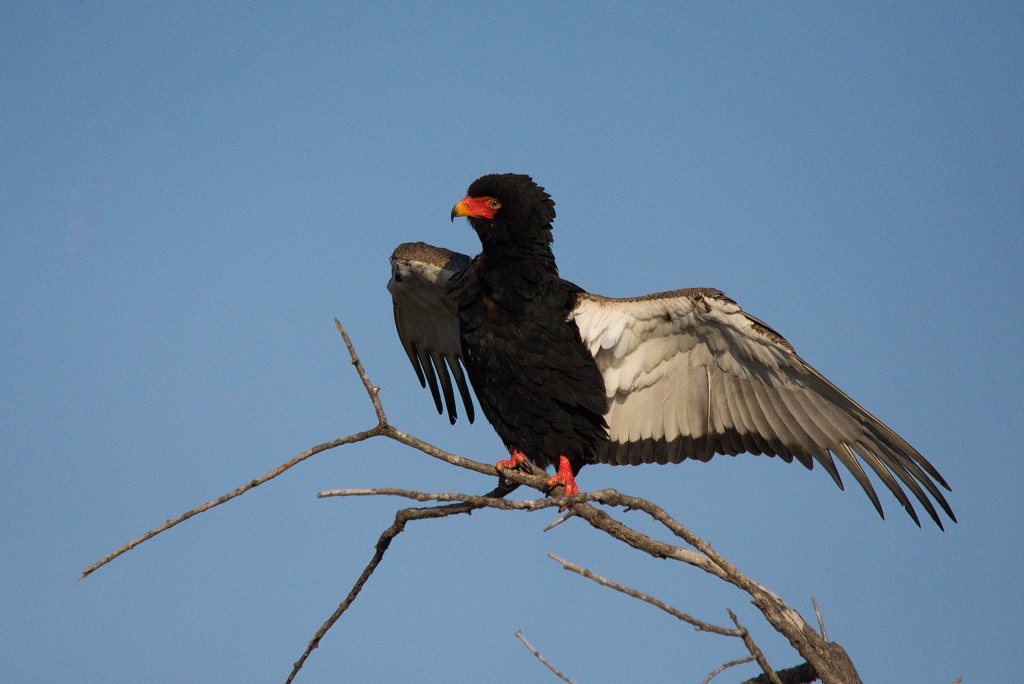Meet the bird of the year
BirdLife South Africa has announced the 2024 bird of the year, and it's the endangered bateleur.
The bird of prey is also known as the berghaan in Afrikaans, ingqungqulu in isiZulu and ingqanga in isiXhosa. According to BirdLife International's data on the species, it is considered globally endangered.
A 2020 classification by The International Union for Conservation of Nature in 2020 also classified the bird as endangered, in its Red List of Threatened Species.
Among the reasons given is that its population has undergone "rapid declines" during the past three generations or 46 years. This is due to "deliberate and incidental" poisoning, pesticides, and nest or habitat disturbance.
BirdLife South Africa similarly noted that the bird tends to scavenge, which puts the species at risk of indiscriminate poisonings, especially by small-stock farmers. "Illegal harvesting of this species for use in the muti trade is another recent trend, which needs to be further investigated," BirdLife South Africa added.
Habitat transformation also negatively impacts the availability of prey for the bateleur, especially outside protected areas.
"There is an estimated population reduction of over 50% over the past three generations (40 years), leaving a regional population size of fewer than 1 000 mature individuals," BirdLife South Africa said.
Andy Wassung of BirdLife South Africa noted the bird's endangered status but said this is not the only factor considered in selecting the bird of the year.
Among the other considerations is whether a broad range of South Africans would recognise and be able to connect with the species, whether it could be incorporated into school learning material, whether the organisation has links to the species through its work or partners and if it has an associated conservation story or need.
The bateleur is known for its distinctive plumage – a combination of black, white, and a vibrant red-orange on its face and legs, BirdLife South Africa said. It is found in the bushveld of the Kruger National Park and equally so in the arid Kalahari.

An adult-female bateleur.
Supplied Melissa Whitecross, BirdLife South Africa
BirdLife South Africa runs the annual competition to raise awareness of the country's birds.
Previous winners include the African penguin (2007), the African fish eagle (2012), the blue crane (2015) and the secretary bird (2019).
Hotter temperatures worsen inequality in SA
Hotter temperatures linked to climate change are worsening inequality in South Africa, a new study shows.
The study, published in the Environmental Research Letters journal this week, shows that in South Africa, the inequality gap widens when the temperature threshold of 15°C to 17°C is breached.
"The Gini coefficient in South Africa is expected to increase by three to six points, resulting in a potential welfare loss of approximately 50% when combined with the impact of warming on GDP," the report read.
Lead author of the report, Shouro Dasgupta, an environmental economist at the Euro-Mediterranean Center on Climate Change, said that the report shows climate change is "already affecting inequality in South Africa and globally."
"Climate change not only increases inequality but also exacerbates many climate-induced societal impacts through increased exposure and vulnerability," Dasgupta added.
READ | Hotter temperatures worsen inequality in SA - study
Shark barriers made in SA to be used in the Bahamas
Shark barriers developed by marine biologists from Stellenbosch University and manufactured in the Western Cape are now being used on a private island in the Bahamas.
The barriers – known as the SharkSafe BarrierTM - mimic kelp forests and make use of a magnetic field to deter sharks without harming them or other large marine species.
They're a safer or eco-friendly option than nets, which are responsible for the deaths of thousands of sharks and other marine life a year, said Dr Sara Andreotti, extraordinary lecture at Stellenbosch University and founding director and chief operations officer of the SharkSafe Barrier.
The installation in the Bahamas is the first commercial one for the company. It is also the "first step" in bringing the technology back home (to South Africa) and replacing the "detrimental shark nets with an eco-friendly alternative", said Andreotti.
READ | SEE | These magnetic SA-made shark barriers are now used in the Bahamas
University of Cape Town launches new climate research centre
To address research gaps about climate change impacts in Africa, a new centre was launched by the University of Cape Town this week.
The African Synthesis Centre for Climate Change, Environment and Development is a place where scientists, researchers, policymakers and civil society can join hands to create solutions for climate change mitigation and adaption, said director Dr Chris Trisos.
"The centre will focus on everything, including the impact of climate change on health, biodiversity, agriculture (and the like). To put it simply, it's about climate change and how we respond to it," said Trisos.
This is the first synthesis centre focused on climate change in Africa and aims to focus on the continent's challenges and solutions. According to the Inter-governmental Panel on Climate Change, data access is increasingly limited on the continent. Africa only received 3.8% of the climate research funding globally between 1990 and 2019.
The centre will put the spotlight on African priorities. "It challenges the perception that Africa is data-scarce. We are quite data- and knowledge-rich [when it comes to climate change]," said Trisos.
South Africa and other developing regions have become increasingly vulnerable to the impact of climate change.
"Weather phenomena such as the floods in KwaZulu-Natal and the water drought in Cape Town were worsened by the El Niño combination," said Trisos.
Research projects at the centre will begin in 2024.- Na'ilah Ebrahim
Newsletter
Weekly
Climate Future Weekly
An overview of the challenges and opportunities of the climate crisis, as it changes the world we know.
Climate community bids farewell to Dr Saleemal Huq
Climate scientist and advocate for climate justice and the loss and damage fund, Dr Saleemal Huq, has died.
It is with heavy hearts that we inform you about the passing away of our director, Prof. Saleemul Huq, on 29 October, 2023.His unmatched legacy will remain as a shining example for years and generations to come. pic.twitter.com/C45D0Ky3tC
— ICCCAD (@ICCCAD) October 28, 2023In its tribute, the Intergovernmental Panel on Climate Change (IPCC) noted Huq's work that focused on ways to adapt to climate change and mitigate or lessen its effects, especially for least developing countries. Huq was also a co-author of three of the IPCC's assessment reports. The IPCC is the foremost body on climate science.
Huq was also "instrumental" to the groundbreaking agreement to establish a loss and damage fund at the climate summit, COP27, held in Sharm el-Sheikh, Egypt, last year. The fund envisions having wealthier nations provide the finance that nations most vulnerable to the severe impacts of climate change require. The details of how the fund will work are to be determined at COP28, which kicks off in the UAE later this month.
"He published hundreds of scientific as well as popular articles and was recognised as one of the top twenty global influencers on climate change policy in 2019," the IPCC's tribute of Huq read.
Huq was the director of the International Centre for Climate Change and Development (ICCCAD), based in Dhaka, Bangladesh. The centre is a research and capacity-building organisation focused on climate change.
The 71-year-old was also a professor at the Independent University of Bangladesh and in 2022, was honored with the Order of the British Empire for his efforts to combat climate change.
He was also recognised as one of the top 10 scientists in the world by the reputable science journal Nature.
Schools shut as toxic smog engulfs India's capital
Schools were shut across India's capital on Friday as a noxious grey smog engulfed the megacity and made life a misery for its 30 million inhabitants.
Smoke from farmers burning crop stubble, vehicle exhaust and factory emissions combine every winter to blanket New Delhi in a choking haze.
Delhi, one of the largest urban areas in the world, is also regularly ranked as one of the world's most polluted cities. Levels of the most dangerous PM2.5 particles - so tiny they can enter the bloodstream - were on Friday almost 35 times the daily maximum recommended by the World Health Organization, according to monitoring firm IQAir.
New Delhi last month launched a "Green War Room" to combat air pollution. It consists of 17 experts monitoring giant screens livestreaming pollution hotspots, beaming in NASA satellite imagery and updating air quality index (AQI) sensors.
"As soon as the AQI worsens, we alert our teams on the ground and they take action immediately," said the war room's environmental engineer Anurag Pawar.
War room officers say they are doing what they can - like monitoring reports sent via a "Green Delhi" phone app, which allows residents to send geolocated photographs of pollution problems. - AFP
Climate funding adaptation gap higher than estimated
The funding gap for climate adaptation is 50% higher than previously estimated, the UN Environment Program (UNEP) said.
Developed countries pledged in 2009 to provide $100 billion a year in climate finance to poorer nations, and mobilising funds will be a key talking point in COP28 negotiations in Dubai at the end of November. The $100 billion pledge, which has not been fully secured, was aimed at helping poorer countries not only mitigate climate change by cutting greenhouse gas emissions but also to adapt to rising temperatures and sea levels.
Flows toward adaptation fell 15% in 2021. The 2017-2021 financing amounted to about $3 a person, and annual flows dropped 15% in 2021, explained Georgia Savvidou, a researcher at Chalmers University of Technology and a co-author of the UNEP report. "We really need ambitious adaptation action this decade, and if not, we will increase losses and damage," she said.
Every $1 billion spent on tackling coastal flooding, for example, would help avoid $14 billion in economic damage, the UNEP said.
UNEP estimated that developing countries required $215-$387 billion per year until 2030 to adapt to climate impacts, with the figure set to rise significantly by 2050. - Reuters and AFP
Warm weather keeps migratory cranes in Hungary longer
The plains of eastern Hungary have seen a record number of cranes staying over in unusually warm weather this autumn, with more than 194 000 roosting in the shallow marshes at a time, with no inclination to leave for Africa.
Hungary's Hortobagy National Park is one of the most important staging areas globally for the common cranes, which stop over there on their flyway from northern Europe to Africa, to feed and gather strength before the long journey. This autumn their stopover does not seem to end, with an estimated over 163 000 cranes still roosting in the national park over the past weekend.
Attila Szilagyi, a nature protection guard at the park, said this was due to warm temperatures of above 20 degrees Celsius in October, and because there was plenty of food available this year on nearby corn fields, contrary to 2022 when a drought hit the region.
"The normal migration cycle of the cranes lasts from mid-September until end-October, early November. Now it's November already, and the cranes are here in masses." - Reuters
Comedian Nish Kumar translates climate science
A project to communicate climate science in a way that is more accessible to people from all walks of life has released a new video. It features comedian Nish Kumar, who translates the science behind extreme weather, as told by climate scientist Dr Friederike Otto.
Watch it here:
 (1).png)
 1 year ago
25
1 year ago
25













